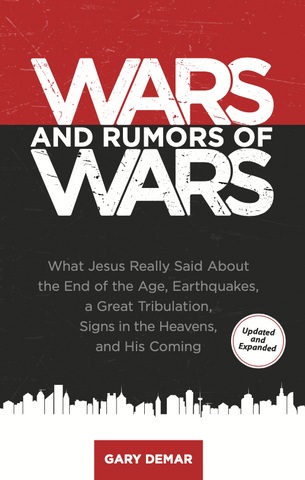Gary answers a question that we get often: “If so much of the New Testament is fulfilled, now what do we do?”
In the book The 1980’s: Countdown to Armageddon, prophecy writer Hal Lindsey wrote, “The decade of the 1980’s could very well be the last decade of history as we know it.” How long and wrong can prophetic speculation go on before a cultural collapse takes place? What a person believes about Bible prophecy determines how he or she will live in the present and plan and work for the future.
What we are seeing today is the end of a humanistic worldview that cannot sustain itself. God has placed before us a wonderful opportunity. Will we meet the challenge? Charles H. Spurgeon, the great nineteenth-century Baptist preacher, made these comments in his commentary on Psalm 86:9:
David was not a believer in the theory that the world will grow worse and worse, and that the dispensations will wind up with general darkness, and idolatry. Earth’s sun is to go down amid tenfold night if some of our prophetic brethren are to be believed. Not so do we expect, but we look for a day when the dwellers in all lands shall learn righteousness, shall trust in the Saviour, shall worship thee alone, O God, and shall glorify thy name. The modern notion has greatly damped the zeal of the church for missions, and the sooner it is shown to be unscriptural the better for the cause of God. It neither consorts with prophecy, honours God, nor inspires the church with ardour. Far hence be it driven.
You can’t beat something with nothing, and you certainly can’t beat something if you give up on the future. Jacques Barzun, author of numerous books that trace the history of ideas and culture, offers an assessment of how the future is discounted by the perception that the present is bankrupt, near collapse, and hopelessly lost:
Sooner or later, the sophisticated person who reads or hears that Western civilization is in decline reminds himself that to the living ‘the times’ always seem bad. In most eras voices cry out against the visible decadence; for every generation—and especially for the aging—the world is going to the dogs. In 1493—note the date—a learned German named [Hartmann] Schedel [1440-1514] compiled and published with comments the Nuremberg Chronicle. It announced that the sixth of the seven ages was drawing to a close and it supplied several blank pages at the end of the book to record anything of importance that might occur in what was left of history. What was left, hiding around the corner, was the opening up of the New World and a few side effects of that inconsequential event. A glance at history, by showing that life continues and new energies may arise, is bound to inspire skepticism about the recurrent belief in decline.
Even during a time when the end of Israel’s world was taking place and Christians were being persecuted, the church advanced and changed the world at large. What we are seeing today is a collapse of God-denying materialistic worldviews that cannot survive as they become consistent with their unsustainable operating presuppositions. The apostle Paul wrote, they are “always learning and never able to come to the knowledge of the truth… But they will not make further progress” (2 Tim. 3:7-9).

Wars and Rumors of Wars
A first-century interpretation of the Olivet Discourse was once common in commentaries and narrative-style books that describe the fall of Jerusalem in AD 70. There is also a history of skeptics who turn to Bible prophecy and claim Jesus was wrong about the timing of His coming at “the end of the age” and the signs associated with it. A mountain of scholarship shows that the prophecy given by Jesus was fulfilled in exacting detail when He said it would: before the generation of those to whom He was speaking passed away.
Buy NowGary answers a questions that we get often: “If so much of the New Testament is fulfilled, now what do we do?” It’s a bit of a confounding question because people are essentially saying Jesus accomplishing all that He said He would isn’t good enough. We live in a whole new world, one that isn’t bound to the death and futility of the sacrificial system and the types and shadows of the Old Covenant.

